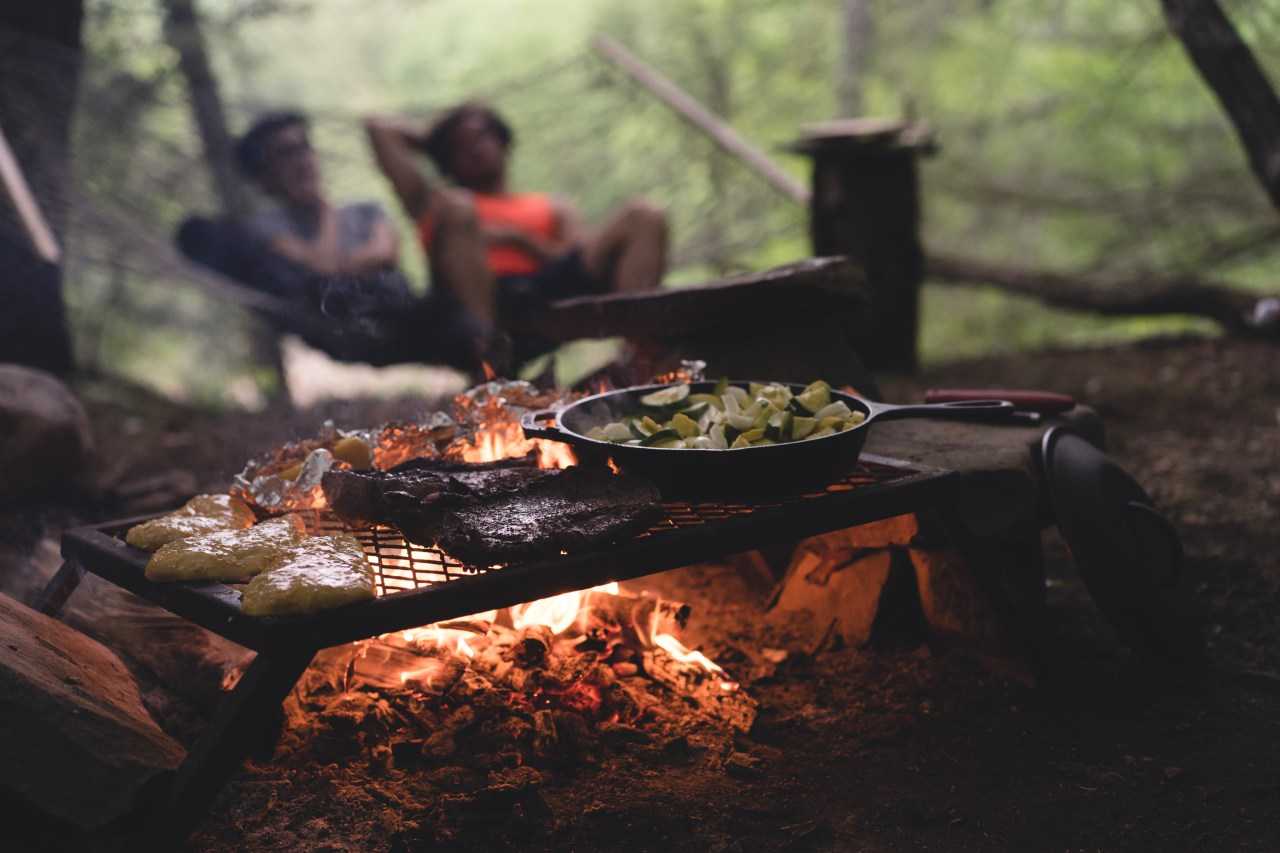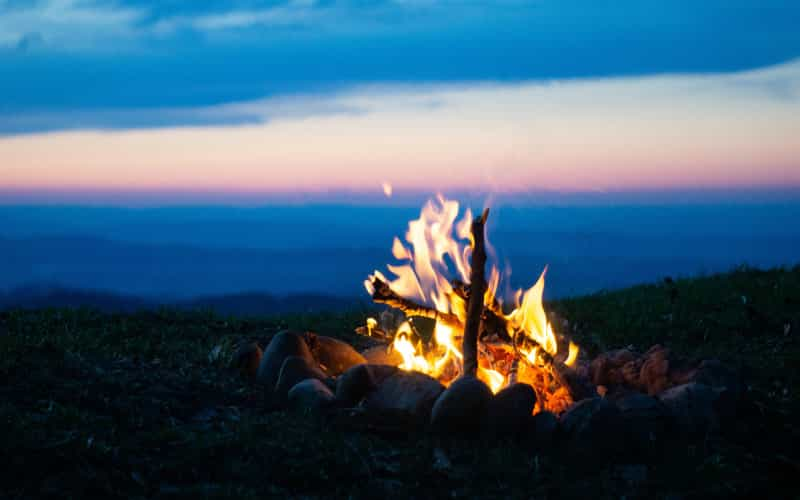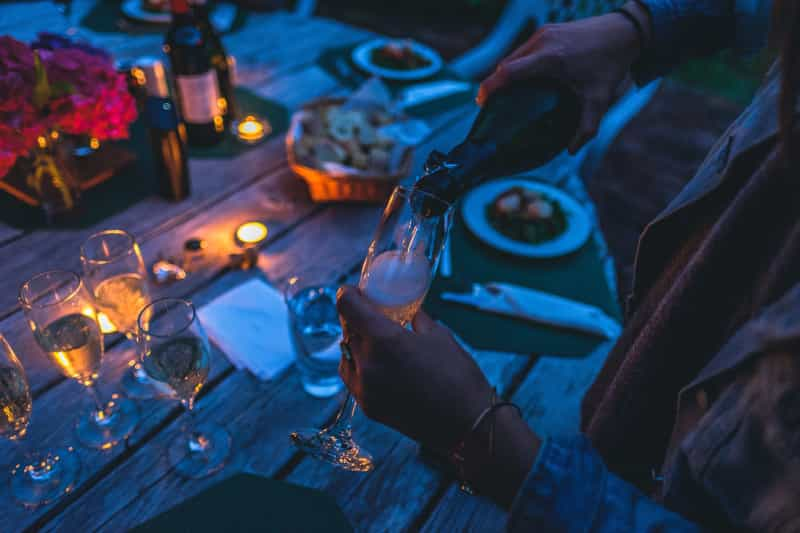Camping without electricity
These days we take electricity for granted, so the thought of going back to basics when camping can be a daunting one. But in fact it is perfectly easy to camp without electricity, and it can significantly ramp up your enjoyment of the camping experience. For example, staying on a ‘dark skies’ site, without any electricity or light pollution, will allow you to see stars glittering in the Milky Way on clear nights
This article shows you how to camp without electricity and what you may want to bring along instead, and should hopefully instil you with confidence that camping with electricity is possible – and indeed can be a wonderful experience.

Alternative power sources for camping without electricity
Even if you’re camping in summer, it can get cool in the evenings – so here are some tips for keeping warm without electricity at your campsite. Check out our tips for pitching in winter too.
Batteries
Take battery-powered devices with you. You can simply replace the batteries in most of these devices if they run out. Some of the most common are:
-
Battery-operated torches, lanterns and 'candles'.
-
Radio.
-
Fan for keeping cool.
Portable battery packs
Buy battery packs to charge up your smartphones, or bigger packs that can power mini fridges and lighting. Make sure they are fully charged before you leave home.
Solar panels
-
Solar power is sustainable and free. These days you can buy compact portable solar panels for a reasonable price and mount them on the roof of your car, or place mobile panels or roll-up solar blankets wherever they will absorb the most sunlight. Of course, their productivity is dependent on sunlight and temperature.
-
Many campsites can supply solar-powered battery chargers for a small fee.
-
Solar-powered generators are available, but they come at a price. The good news is that you can plug all your devices into a solar-powered generator and use it as your main source of (sustainable) electrical power.
Car batteries
Use your car battery to charge a phone or other device. Most cars have USB ports in them now, so you can plug in and charge your phone when the engine is on and the car is moving. Just be aware that this will quickly drain the battery if the car is parked.
Portable generators
Providing a backup when electric hook-ups are not available, portable generators provide enough power to keep a family’s phones, tablets and laptops charged. They are also able to run things like a fridge, lamps, a grill or a tent heater.
Portable generators run off petrol or gas. They are durable and compact, so will pack away easily and can be set up anywhere, meaning you have a reliable source of power wherever you set up camp.
However, they do emit carbon monoxide, which is odourless and colourless. For this reason, never use a generator inside your tent, and always run it outdoors.
Campfires
There’s nothing more romantic than sitting around your campfire, socialising, chatting and cooking. Whether you’re tent camping, glamping or in a motorhome, many sites permit the use of campfires – but do check ahead to make sure you're aware of any restrictions.
Make sure you follow the rules on building a campfire and staying safe around the fire, and you’ll soon feel the following benefits:
-
Providing heat on cool days and at night.
-
Acting as a source of light on a dark night.
-
Using the fire for cooking and making hot drinks.
-
Making it the focal point of your camping pitch.
-
Socialising around the fire.
Check out Pitchup’s list of sites that allow campfires
Portable wood-burning stoves
Using a wood-burning stove allows you to cook and stay warm using logs and sticks from around the campsite as fuel or buying a bag of firewodd. If you're foraging for wood, please remember – only use fallen wood, and never chop down trees.

Cooking without electricity
When you’re camping, you don’t need electricity to cook. For many people, cooking on a campfire is an integral part of the camping experience, but there are several other reliable and alternative cooking methods to consider, including gas-powered camping stoves, charcoal barbecues and eco-friendly solar cookers.
Camp lighting options without electricity
If you’re camping without electricity, you’ll need to take alternative sources of light so you can illuminate both your tent and the area immediately around it. They’ll also act as a beacon to guide you back to your tent after dark. Some ideas for this include:
-
Battery-powered torches, headlamps and clip-on reading lights.
-
Decorative battery-powered lanterns, candles and tea lights.
-
Solar-powered fairy lights with rechargeable batteries.
-
Solar lights and torches with an integrated solar panel (these can also be used to charge phones).
-
LED rechargeable lanterns.
A word of warning: some lighting options that are suitable for use outdoors should not be used inside a tent. If you burn a candle with a wick in your tent, it’s essential to snuff it out before you go to sleep, otherwise it’s a fire hazard. Likewise, oil lamps fuelled by kerosene give off strong toxic odours that can be highly dangerous in enclosed spaces.

How to keep food fresh without electricity
A little forward planning will ensure that your food stays fresh and safe when you’re camping without an electric hook-up.
Use a cooler
-
Throw a bag of loose ice into the cooler before you start packing your food into it. That way, the temperature inside the cooler will be cold and your food will stay chilled for longer.
-
You can also pack pre-frozen food and (plastic) bottles of water.
-
To pack the cooler for maximum effect, place ice packs on the bottom, then layer on double-wrapped meat, dairy products and packaged foods, with loose items above those, and snacks and sandwiches last to go in. Top the lot with more ice.
-
Consider using two cooler bags (one for food and the other for drink), keeping them out of direct sunlight and covering them for further insulation.
-
Invest in a fridge thermometer to check that the food is at a safe temperature for eating (4°C/40°F or lower).
Put food in running water
If there is a stream on your campsite, package up food and drink in waterproof bags (or a crate) and put them in the running water to keep cool. Anchor them with a rope to make sure they don’t float away.
Cover drinks with a cloth
For a rudimentary 'fridge', keep drinks cold by covering them with a wet cloth or towel regularly soaked in cold water.
Take a stock of food that doesn’t need chilling
Tinned food, pasta, rice and pulses can all be stored without being chilled, as can coffee, tea, bread, vegetables and fruit. Keep perishables in the shade.
Keeping warm at night without electricity
Some ways to keep warm overnight when you are camping without electricity.
-
Eat a high-calorie evening meal.
-
Warm up with some exercise.
-
Play games with the kids to keep warm.
-
Fill up a hot-water bottle.
-
Wear a woolly hat (heat escapes through your head).
-
Pack a low-temperature sleeping bag (goose down or flannel).
-
Put an extra cover over your sleeping bag.
-
Wrap up in a mylar (or foil) blanket.
-
Place a foam sleeping mat between your sleeping bag and the groundsheet.
-
If you have a dog, let them sleep in your tent for extra body heat. For more on this, see how to go camping with your dog.
Camping without electricity FAQs
Can I go camping with electricity?
Yes, camping without electricity is really very straightforward. There are plenty of alternative ways of keeping warm, cooking and lighting up your campsite without needing electricity.
How do I get power when camping without electricity?
Among other options, you can use solar panels or solar-powered battery packs (often available for hire at campsites), cook on the campfire or take portable battery packs with you.
How do I cook without electricity?
There are many ways to cook at a campsite that don’t include electricity, from building a campfire to using gas-powered barbecues, plus many other alternatives.